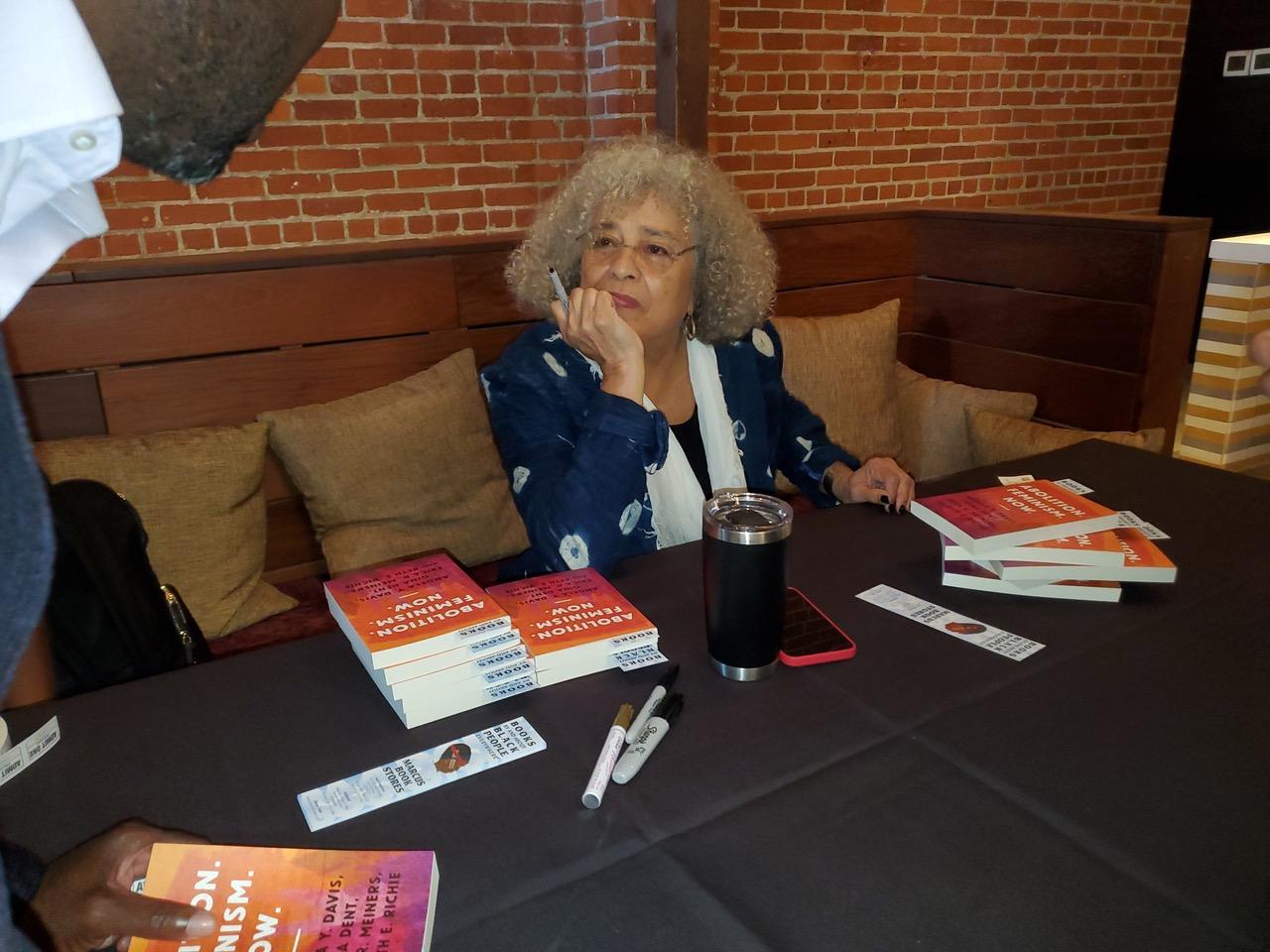
Angela Davis Shares Insights on Domestic Violence in Black Communities During Sacramento Panel
By Antonio Ray Harvey | California Black Media
Philosopher, civil rights activist, college professor, author, and former political prisoner Angela Davis put a lens on the deep-rooted damage domestic violence sows in the Black community, pulling from research she conducted for her 1999 book, “Blues Legacies and Black Feminism.”
The book examines the careers of influential Black women blues singers Gertrude “Ma” Rainey, Bessie Smith, Ida Cox, Rosa Henderson, and Billie Holiday in historical, social, and political contexts.
“I noticed that many of them sang about violence,” Davis said. “They sang about what was happening in their relationships.”
On Oct. 30, Davis shared her perspective on domestic violence as part of a conversation that addressed the disproportionate impacts Domestic Violence has on Black women and families. The event, hosted by Blue Shield of California Foundation (BSCF) and the California Black Freedom Fund (CBFF), was held in Sacramento.
CBFF is a five-year, $100 million initiative focused on Black power-building and ensuring movement-based organizations have the sustained investments they need to challenge systemic and institutional racism.
Davis joined representatives of other organizations to discuss policies needed to end intimate partner violence. The gathering, mostly journalists, was a recording session at the offices of the news publication CalMatters and part of BSCF’s podcast series for Domestic Violence Awareness Month.
Participants included Karen Earl, CEO of the Jenesse Center; Trina Greene, founder and Executive Director of Parenting for Liberation; Kelli Dillon, from the City of Oakland Department of Violence Prevention; and Eric Morrison-Smith, Executive Director of the Alliance for Boys and Men of Color.
Debbie Chang, President and CEO of BSCF, and BFF Executive Director Marc Philpart facilitated the activities, while journalist Bonnie Boswell moderated the roundtable discussions among Earl, Green, Dillon, and Morrison-Smith.
“We really needed to have this session focus on the disproportionate impact of domestic violence especially on California’s Black community,” Chang told California Black Media. “We’re shining a light on it and bringing attention to it. We can’t be silent about it. What we want are solutions.”
Davis, who will turn 80 on Jan. 26, is best known as a champion became of prison reform, women’s rights, racial equality, and the inequality of capitalism. An advocate for the LGBTQ community, Davis was once an active member of the Communist Party USA and the Black Panther Party for Self Defense.
Today, she is the Distinguished Professor Emerita of the History of Consciousness at the University of California at Santa Cruz. She first became aware of domestic violence as a “political issue” in the 1970s, she said. Davis stated that intimate violence not only affects women but men, children, and families.
“We’re talking about a form of violence that has been in most human societies for hundreds of years. We also learned how to hide it, and then, somehow, it’s represented as just the problem of the survivor,” Davis said. “It’s always been considered a women’s issue.”
Davis pointed out that she wanted everyone to understand that domestic violence didn’t emerge during the feminist movement of the 1960s and 1970s.
“We periodized that movement as happening in the ’60s when women, largely White, began (speaking out against violence against women),” Davis said. “I wanted us to have a sense of how long it often takes for these ideas to make a difference.”
With support from BSCF, Social Action Partners (SoACT) developed a mixed-methods study of perceptions and attitudes surrounding domestic violence in California’s Black/African American community.
The report, 2017 Black Leaders Survey on Domestic Violence, provides the BSCF domestic violence advocates and community
stakeholders’ insights on how Black communities in California perceive the challenges they face in combating domestic violence.
According to the National Intimate Partner and Sexual
Violence Survey, 34%, or one in three California women report experiencing domestic violence at some point in their lifetimes. The BSCF report states that 42.5% of Black women report experiencing intimate partner violence, compared to 39.3% of White women and 30.2% of Hispanic women.
On March 8, the Los Angeles City Council received an Equity Analysis on the Violence and Crime that Black women and girls experience from the Civil, Human Rights, and Equity Department (LA Civil Rights).
Overall, violent crime rates have decreased in Los Angeles over a 10-year period but the number of Black women experiencing violence has increased. Black women comprise approximately 4.3% of Los Angeles’ population but they often make up approximately 25% to 33% of victims of violence, the report stated.
The San Francisco Family Violence Council’s 2020 report also revealed racial disparities among domestic violence survivors. It states that 28% of dependent adult abuse victims were Black; and more than half of domestic violence victims were Black or Latino.
For Philpart, the drive to prevent domestic violence is personal. His grandmother was killed by her husband in 1965 after she divorced him and remarried.
“It’s important for us to have this conversation about the Black community because we often don’t talk about domestic violence,” Philpart said. “As the panelist said, we keep DV as something that is unspoken of or is part of our family history that’s never unearthed.
Philpart’s family tragedy highlights another statistic. According to the Center for Relationship Abuse Awareness, 75% of homicides related to domestic violence occur after intimate partners’ separation.
“We are gathered here today discussing an issue that first became a part of discourse over 50 years ago. As a matter of fact, this is the most widespread, pandemic form of violence in the world,” Davis said.




